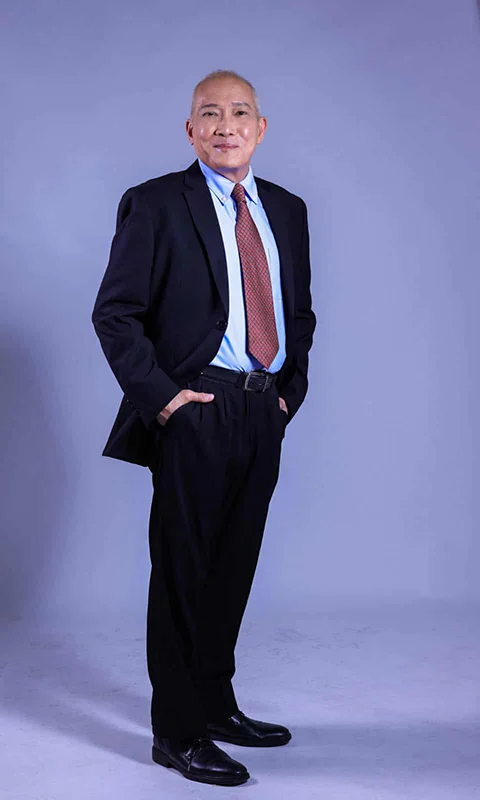At a media briefing held at Dulcinea Morato last May 15, 2025, newly appointed Securities and Exchange Commission (SEC) Commissioner Rogelio V. Quevedo laid out his vision for the agency’s future—one shaped by technology, transparency, and service with compassion.
Commissioner Quevedo officially joined the SEC in August 2024, following the passing of Senior Deputy Executive Secretary, Commissioner Hubert Guevarra. Quevedo brings decades of experience from the private sector, including a 15-year stint at PLDT and Smart Communications where he once headed their International Business Division. He also served as President of the PLDT Smart Foundation before retiring in 2012. Prior to his SEC appointment, Quevedo was Government Corporate Counsel, providing statutory legal support to all government-owned and controlled corporations.
Having taken his oath under Presidential Assistant for Economic Affairs Frederick Go, Quevedo made it clear from the outset that his seven-year term will be guided by a singular philosophy: “Innovation rooted in practicality.”
“I am a regulator, but I do not have a mindset of a regulator. I am an innovator that can regulate,” he expressed.
SEC’s Digitization Journey
Quevedo’s priority is to further enhance the SEC’s digital infrastructure. Though SEC’s digitization efforts began in 2021, Quevedo says the process has evolved significantly under his watch. “I kept hearing complaints about slow processes. So, I went through it myself—and pointed out the hitches.in the past month, I was able to register already without hitches,” he shared, noting that business registration can now be completed in as fast as 15 minutes.”
Quevedo takes pride in the real-time processing capabilities now made possible thanks to AI. Beneficial ownership disclosures, once prone to delays, are now automated.
“This is where I take pride—the digitization of the SEC has really greatly improved in the last few months “he said.
His time with the Office of the Government Corporate Counsel (OGCC) also saw him automate its information retrieval system, dating back to records from 1938.
Cybersecurity & Combatting Scams
Drawing from his early government service as Chief of the Immigration Intelligence Division, Quevedo is aware of national security threats—including those in cyberspace. “The bigger threat today is cybersecurity. Identity theft, service stoppage—these are real concerns. That’s why I believe in cloud-based systems; they offer the best available security measures.”
Under his leadership, the SEC has heightened its monitoring of fintech scams and unregistered financial lending entities. He is especially focused on previous fraud cases such as what happened before in the infamous ₱50-billion KAPA (Kapa Community Ministry International Inc.) investment scam in Pagadian. “Capital is not the issue,” he said. “The problem is that people still don’t know where to invest safely. That’s where we need to earn their trust.”
One key initiative is the integration of blockchain technology to monitor licensed financial lending companies and reduce unfair collection practices. “When collection practices improve, interest rates drop and our borrowers benefit from the low interest rates” he said.
AI as a Regulatory Tool Quevedo holds pragmatic views on artificial intelligence. “AI is not just a technology—it’s a process. It’s only as effective as the data and people behind it,” he noted, warning of potential biases built into AI systems.
Still, he believes AI can significantly aid the SEC by automating repetitive functions like information retrieval and monitoring of filings. “Your job won’t be replaced by AI,” he quipped, “but by someone who knows how to use AI.”
However, enforcement remains a human endeavor. He further stated “Automation can help us process data, but it cannot yet replace sound judgment in enforcement.”
Easing the Business Burden
As a former private sector leader, Quevedo knows the challenges faced by entrepreneurs. He is particularly focused on easing reportorial requirements, especially for small businesses and one-person corporations.
“The mandate is ease of doing business. Not more forms or penalties.” He supports reducing unnecessary filings and introducing educational campaigns to boost financial literacy—starting as early as high school.
The Man Beyond the Regulator
Beyond the title, Commissioner Quevedo is a family man. His wife, Dr. Linda Quevedo, is an obstetrician, and they have three accomplished adult children—a lawyer in Florida, a dentist, and a medical doctor. “She’s the Chairperson at home,” he joked.
He also maintains strong ties with the academic community, having taught at the UP College of Law and pioneered innovations like the UP Bar Review Center in Cebu. “Back then it was Betamax tapes. Now it’s Zoom and Teams.”
A Regulator for the Future Quevedo’s journey from telco innovations to SEC digital improvements, Quevedo’s career has been a testament to forward thinking. He closes with a reminder of the Commission’s role: “SEC doesn’t impose innovation—it creates the climate for it. Not everything new is good. We must listen to our stakeholders and innovate according to what they need.”
In a landscape of evolving threats and technology, Commissioner Quevedo brings a unique blend of regulatory authority, industry expertise, and compassion—positioning the SEC to not just keep up with the future but help shape it.




